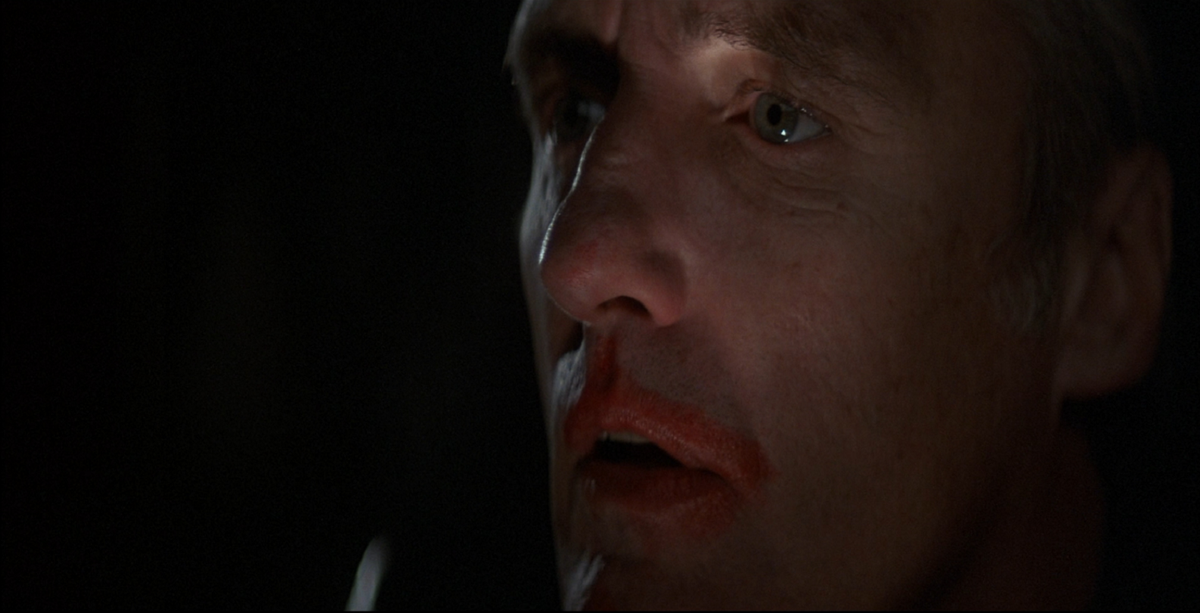IN DREAMS AND NIGHTMARES

A candy-colored clown they call the sandman
Tiptoes to my room every night
Just to sprinkle stardust and to whisper
Go to sleep, everything is alright
There's something about certain original songs being used in specific types of films that can both corrupt and enhance the way one hears them forevermore, like permanent scars. It might also be called an unholy alliance, but artistically, it can certainly yield and heighten some brilliantly terrifying scenes. Two songs featured in David Lynch's 1986 mystery/crime film Blue Velvet have that effect on me—it's almost impossible not to think of Lynch's dark, 1980s Americana noir world of Lumberton, North Carolina, when I now listen to them in their original form, far removed from their movie context.
For those of you who've seen Blue Velvet, you'll be familiar with Frank Booth (Dennis Hopper), one of the most sadistic and sexually disturbed characters in cinema history, who seems to find extra inspiration for his primal emotions while listening to Roy Orbison's "In Dreams" or quoting Ketty Lester's "Love Letters." In one bizarre scene, Booth insists that his friend Ben (Dean Stockwell) lip-sync to "In Dreams" as Frank watches on, becoming intensely and emotionally engaged, almost aroused by the surreal performance. This unsettling moment mirrors, in some disturbing way, his deeply troubling sexual encounters with nightclub singer Dorothy Vallens (Isabella Rossellini), whom he routinely abuses, blackmailing her by holding her young son hostage.
Later, when Jeffrey Beaumont (Kyle MacLachlan) confronts Frank Booth about his abusive behavior, having himself been taken hostage for a joyride by Frank's goons, the psychotic Booth smears red lipstick across his face and pummels Jeffrey with furious fists, all while quoting In Dreams. He then menacingly threatens to send him a "love letter," though it's unclear at first what he means by this.
"You know what a love letter is? It's a bullet from a fucking gun, fucker! You receive a love letter from me, you're fucked forever!"
Looking like a "Candy-Coloured Clown" as he riffs on the "Love Letter" theme, Booth transforms into a satanic embodiment of evil. Much like Charles Manson's famous association with The Beatles' Helter Skelter, Frank uses the cultural references that inspire him as part of his demonic modus operandi. In a sense, Frank's love of these seemingly innocent songs corrupts our own relationship with them, just as Jeffrey is corrupted by his voyeuristic experience watching Dorothy Vallens from her closet (like a perverted Jimmy Stewart in Rear Window). He comes to realize that his idyllic hometown of Lumberton has a far darker underbelly than what first appears behind the white picket fence facade that colors our initial impressions of the place.
One might also argue that Lynch himself acts as a kind of abuser, subverting the Norman Rockwell image of America and forcing us, the audience, to witness the dark, gothic nightmare behind the picture-postcard gloss. Like Britain's Dennis Potter, Lynch seems to delight in creating a disturbing schism between innocence and experience, dreams and nightmares, using the popular culture of both England and America in a subversive way that corrupts our original associations with those same cultural artefacts.
Finally, a scene that always unsettled me personally was toward the end of Blue Velvet where Jeffrey Beaumont returns to Vallens' apartment only to find the corrupt police detective 'Yellow Man' dead, standing eerily upright with a bullet in his brain and somehow activating spasmodically a light fitting nearby while 'Love Letters' plays over a montage sequence highlighting the criminal carnage of Frank Booth in Lumberton. It exemplifies this uneasy dance between good and evil that Lynch has been so good at conveying throughout his entire career. See also Twin Peaks.
Ultimately, what Lynch has taught me as a writer/storyteller is that the use of popular songs, framed against a more disturbing reality, actually heightens their power, poignancy, and sincerity, rather than detracting from them. In this sense, he both honors the original art and subverts it simultaneously, creating a middle path where his work and that of the original artists bleed into one another, forming a new and strange dream of Americana and pop culture.
Certainly, In Dreams and Love Letters mean so much more to me now through Lynch than they would have if I’d simply stumbled upon them on a Dreamboats and Petticoats compilation.
And I’m still perpetually haunted by Frank Booth with his red, lipstick-smeared lips every time I hear Love Letters, knowing that if I ever receive one from him personally, I’ll be "fucked forever."